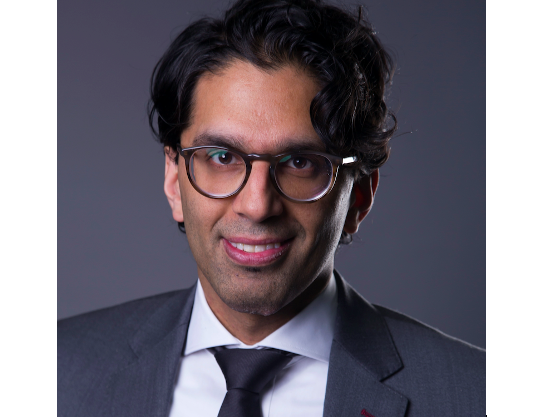Expert Interview: Aleem Bharwani
Ottawa Dialogue’s September 2023 Newsletter features an interview with Dr. Aleem Bharwani. Aleem is a physician (internal medicine) and clinical associate professor at the University of Calgary where he is the Director of Public Policy and Partnerships for the Cumming School of Medicine and O’Brien Institute for Public Health. He is also a Senior Research Fellow with the Ottawa Dialogue. Our discussion looks at his ongoing work on applications of multitrack diplomacy in public health settings, particularly in settler-Indigenous dialogue in Alberta.
- Could you describe the work you have been doing with the Ottawa Dialogue in the past nearly two years?
I co-founded the UCalgary Pluralism Initiative a few years ago. Under this umbrella initiative, we seek to facilitate cross-sectoral, transdisciplinary, and transcultural understanding and collaboration towards a more cohesive, vibrant, and innovative society. A precondition to achieving these objectives is some semblance of shared understanding – for which dialogue is a prominent vehicle.
I am also an internal medicine physician and trained in public policy, so my starting point was to ground these otherwise exceptionally broad concepts in a local reality. And from my experience toeing into the “citizen diplomacy” space, I was quite confident that the mechanics and wisdom of Track Two diplomacy would serve public health well. While Track Two is historically based in polarized armed conflict settings, the lessons apply quite well when we consider that public health problems, such as pandemics, discrimination, mass migration, and mental health, do not sit cleanly in a single policy domain but cross ministries, departments, orders of government, and require solutions from across sectors to meet the needs of multiple identities, cultures, and ideologies.
Facilitated Dialogue emerges as a sensical path forward. And I wished to study whether and how this idea was valid.
- What was your motivation in joining the Ottawa Dialogue and beginning your research and programming on multitrack diplomacy and public health? Is this an underexplored intersection?
My undergrad was in basic science and business; then I studied medicine and public policy; and subsequently worked in medical education and public health leadership. Professionally, I have always felt like I am straddling worlds – connecting dots across silos. And I found, especially in Peter Jones and Julia Palmiano Federer an intellectual multilingualism and a shared commitment to peace and vibrancy, only in different contexts. They complement each other remarkably well – and I was drawn to the dynamic applied scholarly milieu that is the Ottawa Dialogue.
- What is the trajectory of your work on this intersection? In your view, what is the trajectory of the public health/informal diplomacy field more generally?
I remember listening to a speaker at a social media conference who was presenting local polling data ahead of a provincial election. The speaker was shocked that healthcare polled 8th on the list of named priorities because he knew that health shapes provincial election outcomes. He was conflating healthcare with health. Issues #1 through #7 were each public policy issues with significant health impacts: opioid crisis, affordable housing, accessible childcare, racism, Truth and Reconciliation, legalisation of Cannabis, etc. The top priorities were all public health issues. And they are all issues that we call “Health in All Policies” because of their complexity that spans ministries, orders of government, and borders.
We have not been effective at making progress on Health in All Policies, which are often wicked problems, because of their inherent complexity, aggravated by widening ideology gaps, conflicting values, institutional inertia, and fixed positions. And this is all in a world that is increasingly polarized, siloed, and digital, often seemingly without any shared reality.
Applying Track Two to public health is not only sensible – but I believe to be the foundation of next generation governance. I believe the future of governance will enshrine informal and facilitated dialogues as we develop systems that bridge and broker differences.
- In your recent International Journal article, you and your co-authors draw similarities between multitrack diplomacy and public health and other non-armed conflict resolution processes like labour negotiations, environmental negotiations, and forest and water negotiations. The article additionally argues that Track Two scholarship but redefine conflict more broadly beyond armed conflict. Are there other non-armed conflict areas that you see your work and scholarship on conflict resolution expanding into or drawing from?
I would like to see us apply these concepts to real-life challenges – in how we govern our municipalities; how we govern our public institutions; and how we unstick intractable policy conflicts.
- Given that this work is innovative and drawing from multiple knowledge traditions and fields, what resources do you recommend for scholars and practitioners wishing to know more about the potential intersections of public health and Track Two?
I know you are looking for specific resources that connect public health and Track Two – but I’d answer your question differently. I’d suggest we each challenge ourselves to learn about fields that reside one concentric circle beyond our own; and once we are comfortable in this new ring, that we then take one more step outward. I think if we each get into these habits, we will not only sharpen our own sense of the value of difference but also our own skill gaps, that could be supported by a diverse team of facilitators to help find consonance across what otherwise keeps us siloed and separate.

Aleem Bharwani
Aleem Bharwani is a physician (internal medicine) and associate professor at the University of Calgary where he founded the UCalgary Pluralism Initiative and is now its Academic Director. Dr. Bharwani is also the Director of Public Policy and Partnerships for the Cumming School of Medicine as well as for the O’Brien Institute for Public Health. He is an active citizen, serving on a variety of community and corporate boards. At the Ottawa Dialogue, he is a senior research fellow focusing on Track Two diplomacy in public health.

